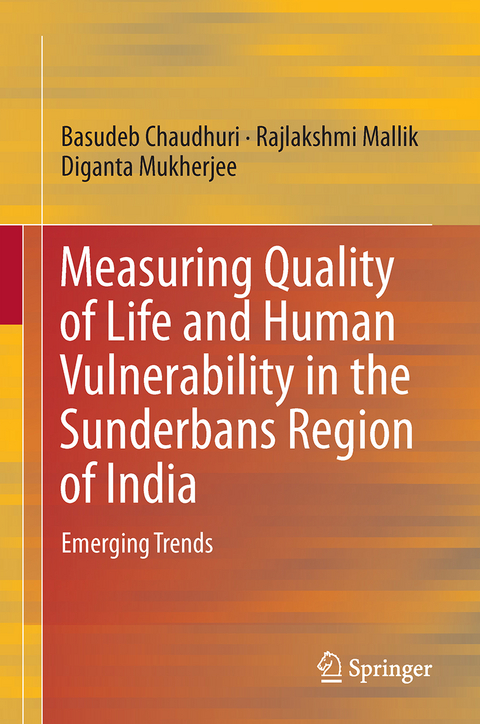
Measuring Quality of Life and Human Vulnerability in the Sunderbans Region of India
Springer, India, Private Ltd (Verlag)
978-81-322-3951-2 (ISBN)
- Noch nicht erschienen - erscheint am 23.06.2025
- Versandkostenfrei
- Auch auf Rechnung
- Artikel merken
The second part comprises a detailed study of subjective life satisfaction, and value systems and priorities. The former refers to people’s perception regarding the various facets of their personal life - economic situation, standard of living, family and friends, work life and environment as also their perception about the well-being of the community. This refers to the overall social, business, and political environment such as social and help network, social inclusion, communal harmony, participation in civic and social activities, job opportunities and employment generation, government developmental project initiatives, disaster management initiatives, law and order etc. Value systems and priorities refer to individual rankings of the factors considered as necessary for personal happiness and for a happy society. It also includes their preferred rankings of government developmental initiatives and views regarding effectiveness and impact of such initiatives.
Dr. Basudeb Chaudhuri, is a faculty at the Department of Economics, Management and Geography, University of Caen, Normandy, France, is on deputation as Scientific Advisor to the French Ministry of Higher Education, Research and Innovation. He has successively held the posts of Vice-President, University of Caen; Director, Centre de Sciences Humaines, New Delhi; National Coordinator, National Contact Point, Horizon 2020 Programme for Social Sciences and Humanities in France; Chargé de Mission, National Institute of Social Sciences and Humanities, CNRS; seconded National Expert of the French Government to the European Commission (Directorate General of Research and Innovation) for Economics, Social Sciences and Humanities. Dr. Rajlakshmi Mallik is a senior development economist, avid researcher and an academician, with a rich experience of twenty two years. A PhD in Economics from Indian Statistical Institute (ISI) Kolkata, she has a long-standing interest and experience in policy-oriented development economics research on financial inclusion, higher education, empowerment, quality of life, sustainable development and vulnerability assessment. She also has extensive teaching experience in various Economics and Management programmes. As Technical Advisor of SSESS, Kolkata, she recently led and concluded a NITI Aayog, GoI project on Status of Women in Science among select institutions in India: Policy Implications. As Director of C-DRAṢṬᾹ which was founded in 2015, she is steering the non-profit research institution towards the realization of its mission of Observe, Reason and Empower. Currently she is leading a project on Sikkim's Green Vision: Strategies and Capacity Building funded by IPR Dept., Govt. of Sikkim, with focus on Green Tourism and Organic Farming. She has worked and has been associated with several institutions of repute in India and abroad. She has published in national and international peer reviewed journals such as Journal of Theoretical and Institutional Economics, Hitotsubashi Journal of Economics, Theoretical Economics Letters, International Game Theory Review, Journal of Economic Research and others. Dr. Diganta Mukherjee is a faculty at the Indian Statistical Institute (ISI) Kolkata. He completed his Bachelor’s and Master’s degrees in Statistics and obtained his PhD in Economics from the same institute. His research interests include welfare and development economics and finance. He is an ex-faculty of Jawaharlal Nehru University (New Delhi), Essex University (UK), ICFAI Business School (Kolkata). He has over 80 publications in national and international journals and authored three books. He has been involved in projects with large corporate houses and various ministries of GoI and West Bengal Govt and is acting as technical advisor to organizations such as Multi Commodity Exchange of India Ltd (MCX), Reserve Bank of India (RBI), Securities and Exchange Board of India (SEBI), and Ministry of Statistics and Program Implementation‘s National Sample Survey Office (NSSO) and National Accounts Division (NAD).
Background of the Study and Survey Area.- Survey Methodology.- A Statistical Description of The Surveyed Area.- Perception and Value System.- Credit Arrangements.- Vulnerability and its Management.
| Erscheint lt. Verlag | 28.4.2025 |
|---|---|
| Zusatzinfo | 10 Illustrations, color; 50 Illustrations, black and white; X, 240 p. 60 illus., 10 illus. in color. |
| Verlagsort | New Delhi |
| Sprache | englisch |
| Maße | 155 x 235 mm |
| Themenwelt | Studium ► Querschnittsbereiche ► Prävention / Gesundheitsförderung |
| Naturwissenschaften ► Biologie ► Ökologie / Naturschutz | |
| Sozialwissenschaften ► Soziologie | |
| Wirtschaft ► Volkswirtschaftslehre | |
| Schlagworte | climate change • quality of life • sustainability • value system • vulnerability |
| ISBN-10 | 81-322-3951-2 / 8132239512 |
| ISBN-13 | 978-81-322-3951-2 / 9788132239512 |
| Zustand | Neuware |
| Informationen gemäß Produktsicherheitsverordnung (GPSR) | |
| Haben Sie eine Frage zum Produkt? |
aus dem Bereich


